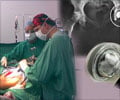Platelet-rich plasma injections are no better than placebo for helping reduce knee pain in people with knee joint osteoarthritis.

‘Patients with knee osteoarthritis should exercise and maintain a healthy weight range to help manage their symptoms and improve their quality of life.’
Read More..




The study, published in the Journal of the American Medical Association, compared a series of three-weekly injections of platelet-rich plasma to three-weekly injections of saline, which acted as a placebo for the study. Read More..
Participants were not aware of whether there was platelet-rich plasma or saline in the syringe during the injections. Participants were tracked for pain levels and cartilage health over 12 months.
Participants who received platelet-rich plasma injections had a significant improvement in their knee pain over one year, the level of improvement was matched by those in the placebo group. There were no differences identified in the MRI scans in both groups.
“We conducted the study because there is currently limited high-quality evidence about whether or not platelet-rich plasma injections have benefits for people with painful knee osteoarthritis.
Our results do not support the use of platelet-rich plasma for people with mild to moderate knee osteoarthritis,” University of Melbourne lead researcher Professor Kim Bennell said.
Advertisement
Contributing author Professor David Hunter, from the University of Sydney, said Osteoarthritis (OA) is a common and disabling disease.
Advertisement
Unfortunately, the particular treatment trialled in this study, PRP, whilst widely used and typically expensive, appears to be ineffective compared to an inert comparator.”
Two hundred and eighty-eight people with mild to moderate knee osteoarthritis participated in the RESTORE study, conducted in Melbourne and Sydney, with funding from the National Health and Medical Research Council.
Source-Medindia












